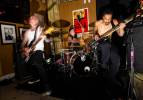Pianist lucked into magic secret for playing traditional jazz in Vegas
Vegas Voices is a weekly question-and-answer series featuring notable Las Vegans.
Las Vegas wasn’t working out for Mike Jones.
A Berklee College of Music-trained jazz pianist with four CDs to his name, Jones followed leads to Las Vegas that didn’t pan out. In 2001, after being “out of work for the first time since I was 16,” Jones took a gig playing background music in the Eiffel Tower Restaurant at Paris Las Vegas.
“This was a gig where I’m playing a Cole Porter melody, and a guy would come up and say, ‘Play some Billy Joel,’ ” he recalls. “I’d say, ‘That’s not really the kind of music I play,’ and they’d say, ‘Well, you suck.’ ”
But as luck would have it, there is another jazz pianist named Mike — Mike Close specifically — and he does magic. And one night he brought Penn Jillette, who later asked if Jones wanted to play piano before the “Penn & Teller” show.
Now Jones plays original music during the show as well as standards for the hour before it. The observant will notice the bassist for the first 40 minutes is Jillette himself. “He once did a bit with the Smothers Brothers and he played Dickie Smothers’ bass and said it just felt right to him,” Jones explains. “He’s now a good professional bass player; he’s not just a good bass player for a magician.”
The “Penn & Teller” gig made it possible for Jones, 53, to keep releasing albums such as his new one, “Roaring,” a set of 1920s standards played aggressively, like the jazz cats of the ’50s.
We talked to Jones about his odd world of jazz, magic and, oh yes, tattoos.
Review-Journal: Why is jazz always hailed as our most authentic American art form, and yet it’s the least commercial?
Jones: One reason is that you really do have to educate yourself to listen to jazz, otherwise you have no idea what’s going on. It’s a simple education process. You buy a few records and maybe read a book to tell you what to listen for.
It is an American art form and should be respected, but it’s a living thing too. Jazz is constantly evolving, and kids should know about it.
RJ: A lot of people will answer that question with, “You have to be a player yourself to be able to listen to it and know what’s going on.”
Jones: That’s nonsense. You can describe jazz very simply. It’s taking a song and playing it, then you play new melodies on the same chords and invent your own melodies over it. At a very basic level, that’s what jazz is: improvising on the melodies and harmonies of the original song to come up with variations.
You do have to know how to listen to that, otherwise it just sounds like noise. It takes a person willing to actively be engaged in the music rather than just having it in the background. If you want to understand it, you have to listen to it and educate yourself a little bit as opposed to it being just a passive thing.
RJ: At some point you can get a real specific taste for something and don’t care what other people listen to, but I guess that happened really young with you?
Jones: I’d say third grade. I had a piano teacher who said he never got up before 11 in the morning, and I knew that was the job for me.
We had two player pianos in the house. My dad had our basement all set up like a bar. Three slot machines, beer on tap, a jukebox and a player piano with about 800 piano rolls. This was the mid-’60s in Buffalo, and all the neighbors came over on Friday night.
My dad listened to nothing but jazz. I grew up around that. By the time I discovered Led Zeppelin in grammar school I was already a big fan of jazz. I just loved all that stuff, but I always knew I wanted to play jazz. I never wanted to not play jazz. I just knew that’s what I had to do.
RJ: When I first met you and saw all your ink and piercings (Jones is pretty much covered) I wondered if you were maybe an original-wave punk rocker who decided super-traditional jazz was the ultimate in punk expression. Even close?
Jones: That’s way too hip for me! (Laughs) I didn’t get my first tattoo until I was 38 years old. I got it as a going-away present for coming out here in 1999. That was about the time people decided, ‘We’re going to look the way we want,” and it suddenly became OK, almost overnight. But nobody saw it coming. I knew the tattoo artists around town, and none of them were saying, “This is going to be the next big thing.”
I went to an older lady on Boulder Highway named Dante, a place (Studio Tattoo) that had been there for 20 years.
I was alone, I had nobody, and they were really good friends and really good people, and I felt comfortable and trusted them. I ended up going every Friday for three hours: ‘Come up with something else.’
I know people get tattoos for a lot of reasons. I am completely superficial. I just think they look cool. Except I could say I didn’t have any tattoos that were visible. But after working at the Eiffel Tower and not enjoying it, I thought, ‘I want to make a living as a jazz musician and I don’t want these kind of things to be an option anymore.’
Not a lot of people are going to hire a cocktail pianist with horns tattooed on his hands.
RJ: Do you find new stuff to listen to today? Or does being a jazz pianist give you carte blanche to hate today’s pop music?
Jones: I was always of the mind that I’m not going to like (pop music) when I get old because it’ll be like, ‘Get off my lawn.’ But I don’t think that’s the case. I think there’s even more of a break from what we consider well-constructed, composed music than we think.
I recently heard some terrible song from the ’70s, I want to say ‘You Light Up My Life,’ even though I don’t think that’s it. But there is more arranging and skill and real musicianship on that record than anything that’s been put out on pop radio in 10 years, and that was a laughable track.
Good music’s never going to go away, it’s just that it’s no longer popular.
Read more from Mike Weatherford at reviewjournal.com. Contact him at mweatherford@reviewjournal.com and follow @Mikeweatherford on Twitter.































